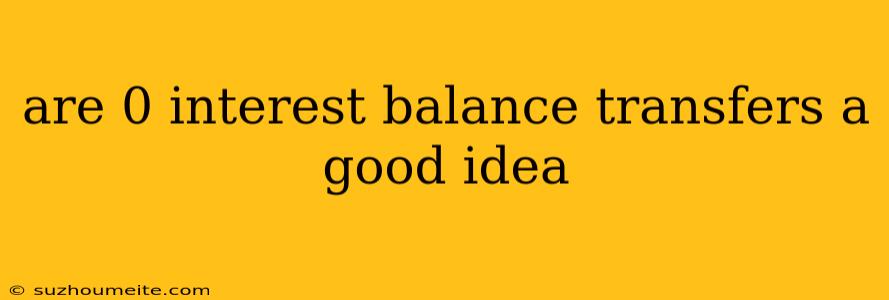Are 0% Interest Balance Transfers a Good Idea?
A 0% interest balance transfer can sound like a dream come true for anyone carrying credit card debt. The promise of no interest for a set period of time seems like a golden opportunity to pay down your balance without racking up more interest charges. But before you jump at the first 0% offer you see, it's crucial to understand the potential downsides and consider if it's truly the right fit for your financial situation.
The Appeal of 0% Balance Transfers
The primary allure of a 0% balance transfer is the opportunity to save on interest payments. This can significantly reduce your overall debt burden and free up more of your budget for other expenses.
Here's how it works:
- You transfer the balance from your existing high-interest credit card to a new card with a 0% introductory APR.
- For a specific duration, usually between 6 to 21 months, you won't pay any interest on the transferred balance.
- During this period, you focus on paying down the balance as quickly as possible.
Potential Downsides of 0% Balance Transfers
While appealing, 0% balance transfers come with their fair share of drawbacks:
- Balance Transfer Fees: Most cards charge a balance transfer fee, typically a percentage of the transferred amount. This fee can cut into your savings, especially if you have a large balance.
- Introductory Period Expiration: The 0% interest period is temporary. Once it ends, your balance will start accruing interest at the card's standard APR, which can be high.
- Minimum Payment Trap: Making only the minimum payment can prolong your debt repayment and leave you vulnerable to accruing interest after the introductory period expires.
- Impact on Credit Score: Applying for a new credit card can temporarily lower your credit score, as it involves a hard credit inquiry.
- Limited Availability: You may not qualify for a 0% balance transfer offer based on your creditworthiness.
When 0% Balance Transfers Make Sense
0% balance transfers can be beneficial in certain scenarios:
- High-Interest Debt: If you have a high-interest credit card balance, transferring it to a 0% offer can significantly reduce your interest payments.
- Disciplined Repayment Plan: You're committed to paying down the transferred balance within the introductory period to avoid accruing interest.
- Good Credit: You have good credit to qualify for the offer and avoid high fees.
- Careful Budgeting: You have a solid budget to handle the transfer fee and consistently make payments above the minimum.
When to Avoid 0% Balance Transfers
- Poor Credit: If you have poor credit, you may not qualify for a 0% balance transfer or face high transfer fees.
- Unrealistic Expectations: You're not confident in your ability to pay off the balance within the introductory period.
- Lack of Financial Discipline: You struggle with managing your finances and making consistent payments.
- High Transfer Fee: The balance transfer fee is too high, negating any potential savings.
Alternatives to 0% Balance Transfers
If a 0% balance transfer isn't the right fit, there are other options to manage your credit card debt:
- Debt Consolidation Loan: This involves taking out a personal loan to pay off multiple high-interest debts.
- Balance Transfer to a Lower APR Card: You can transfer your balance to a card with a lower standard APR, but you won't enjoy the 0% introductory period.
- Debt Management Plan: A debt management plan can help you negotiate lower interest rates and monthly payments with your creditors.
Final Thoughts
A 0% balance transfer can be a helpful tool for managing credit card debt, but it's not a one-size-fits-all solution. Before you jump on an offer, carefully consider the potential downsides, your financial situation, and alternative options. Make a well-informed decision and ensure you have a solid plan to pay down the transferred balance before the introductory period expires.
